2011 年湖北省荆州市中考英语真题及答案
第 I 卷选择题(五大题,共 70 分)
I. 听力对话理解(共 10 分,每小题 1 分)
A)听小对话,根据你听到的内容从每小题的三个选项中选出一个正确答案,每段对话听两遍。
1. What is Julia going to do?
A. Go camping.
B. Do homeswork.
C. Do housework.
2. Where are they probably talking?
A. In the classroom.
B. In a shop.
C. At home.
3. What’s the time now?
A. It’s 2:30.
B. It’s 3:00.
C. It’s 2:00.
4. What will the mother give Dave?
A. A cup of coffee.
B. An orange.
C. Some salt.
5. Where is Jim now?
A. At home.
B. In a science museum.
C. At school.
B)听小对话,每段对话你将听到前面的 1—3 句,从每小题的三个选项中选出能完成对话最后 1 句的最佳
答语,每段对话听两遍。
6. A. Nice to meet you.
B. How are you?
C. This is John speaking.
7. A. Here it is.
B. That sounds fun.
C. You are welcome.
8. A. Noodles and vegetable soup.
B. Knife and fork.
C. White shirt and red shirt.
9. A. Yesterday.
B. Next week.
C. A month.
10. A. And then have a rest.
B. And then take the subway.
C. And then you will enjoy it.
II. 听力篇章理解(共 10 分,每小题 1 分)
听下面 A、B 篇的两段对话和 C 篇的一段独白,并从每小题的三个选项中选出一个正确答案。对话或独白听
两遍。
11. Where was Sally last Sunday?
A. Stayed at home.
B. Went to the library.
C. Went to a movie.
12. How was the boy’s weekend?
A. He had fun.
B. Not much fun.
C. He was tried.
�
13. What else do you know about the boys weekend?
A. Didn’t visit his friend.
C. Didn’t do his homework.
14. Why did the family go to the restaurant for lunch?
A. The food there was nice.
B. It was the mother’s birthday.
C. To spend the boy’s birthday.
B. Didn’t play soccer.
15. How many awful things did the boy tell?
A. 2
B. 3
C. 4
16. What do you think the family members felt about it?
A. Unhappy.
B. Excited.
C. Anxious.
17. How long did the speaker stay with Victor?
A. More than ten years.
B. About three years.
C. Only a few days.
18. How did the speaker do with Victor when he moved?
A. Sold it.
B. Let it go.
C. Sent is away.
19. How did the speaker feel after he left Vicotor?
A. Felt very bad.
B. Was as happy as usual.
C. Needed another dog.
20. What happened to the speaker in the end?
A. He found Vioctor and took it back.
B. His friend sent him another dog.
C. He learned to live well without a dog.
(第 VI 大题,听力完成任务为非选择题,请看第 II 卷第 56—60 题,并在答题卡上第 II 卷答题栏内的相
应位置答题)
III. 单项填空(共 10 分,每小题 1 分)
从每小题的四个选项中选出一个能填入题中相应空白处的最佳答案。
21. — What do you like?
— I run every morning, and often play tennis at weekends.
A. sports
B. music
C. art
D. subjects
22. — What do you want most?
— A room of own.
A. I.
B. me.
C. my.
D. mine.
�
23. — How long can I have your dictionary?
— It will next term.
A. Hold.
B. Take.
C. Return.
D. Keep.
24. — Whose T shirt is this?
— It be John’s. It’s much too small for me.
A. may
B. must
C. can’t
D. shouldn’t
25. — I’m afraid a car is too expensive for me.
— But more and more Chinese can to buy one.
A. expect
B. afford
C. choose
D. offer
26. — Is Lucy of Lily the of the twins?
— Lucy. She was born half an hour earlier.
A. younger.
B. youngest.
C. elder.
D. eldest.
27. — This dress looks beautiful on you. How much is it?
— It me more than a thousand yuan.
A. spent
B. cost
C. took
D. paid
28. — Peter shut his mouth at the meeting all the time. How about Tom?
A. He does so.
B. He did so.
C. So does he.
D. So did he.
29. — Is he still raising money for charity?
— Yes. He never hop of helping poor children.
A. gives up.
B. gives out.
C. takes off.
D. takes out.
30. Which of the following is caused by the earth is turning around the sun?
A. The rising and setting(落下)of the sun and moon.
B. The change of spring, summer, autumn and winter of the year.
C. The change of the day and night.
D. The time in the east it earlier than that in the west.
IV. 完形填空(共 10 分,每小题 1 分)
先阅读短文,然后从文后每小题的四个选项中选出一个可以填入短文中相应空白处的最佳答案。
One day a wise man was walking along the beach when he saw a young man far away picking up
something and very gently throwing it into the sea. As he got (31) he called out to the young
man, “Good morning! What are you doing?”
The young man (32), looked up and replied, “Throwing starfishes into the sea.”
�
“Why are you throwing starfishes into the sea?”
“The sun is up and the (33) is going away. And if I don’t throw them in they’ll (34).”
“But, young. man, don’t you (35) that there are miles and miles of beach and starfishes
all along it. You can’t (36) make a difference!”
The young man (37) politely. Then he picked another starfish and threw it into the sea, and
said, “It made a difference for that (38).”
There is something very (39) in each and every one of us. We have all been given the ability
to make a difference to shape the future. We must each find our own starfish. And if we throw
our starfish wisely and well, the (40) will be better.
31. A. better
B. farther
C. closer
D. faster
32. A. continued
B. stopped
C. watched
D. answered
33. A. water
B. wind
C. boat
D. fish
34. A. leave
B. die
C. run
D. lose
35. A. believe
B. realize
C. expect
D. guess
36. A. possibly
B. hardly
C. especially
D. fortunately
37. A. replied
B. argued
C. spoke
D. listened
38. A. day
B. time
C. place
D. one
39. A. special
B. brave
C. strange
D. lucky
40. A. family
B. village
C. country
D. world
V. 阅读理解(共 30 分,每小题 2 分)
先阅读短文,然后根据短文内容从文后每小题的四个选项中,选出一个能完成所给句子或回答所提问题的
正确答案。
Long March exhibit
(A)
Events
The Shanghai History Museum is putting on exhibition to remember the Long March(长征) which
took place 75 years ago. More than 220 photos and 40 other things are on show. All the exhibition
is explained in Chinese. The show will end on November 20.
Time: 10:00 a.m.—4:00 p.m.
Address: 1286 Hongqiao Road
Ticket: 8 yuan for Chinese/15 for foreigners
�
Thai elephants
Eight elephants from Thailand are an attraction for visitors at Changfeng Park by riding bikes,
playing basketball, dancing and blowing a musical instrument. The elephants give three shows a
day at 9:30 a.m., 3:30 p.m. and 8:00 p.m. and there is an extra show at 1:30 p.m. at weekends.
The show will end on November 15.
Address:189 Daduhe Road
Ticket:30—40
Dancing dolphins
Dolphins jumping from the water to touch a ball, dancing to music, kissing people and doing
easy math problems, and seals and sea lions, also performing, have made a large part of the aquarium
in Peace Park, which interests children greatly.
Hours: 10:30 a.m., 4:00 p.m., and 7:30 p.m.
Ticket: 20 yuan for adults and 10 yuan for children.
41. Where can one see the Long March exhibition?
A. In Shanghai History Museum.
B. In Changfeng Park.
C. In Peace Park.
D. On 189 Dahude Road.
42. How many shows do the Thailand elephants give at weekends?
A. One
B. Two
C. Three
D. Four
43. What may interest children very much in Peace Park?
A. Elephants playing basketball.
B. Dolphins dancing to the music.
C. Seals riding bikes.
D. Sea lions blowing instruments.
44. How much should a child pay to go into Peace Park?
A. Five yuan.
C. Ten yuan.
B. Fifteen yuan.
D. Twenty yuan.
45. Which of the following is true?
A. The Long March exhibition is explained in English.
B. The sea animals can work out difficult math problems.
C. Thai elephants’ shows can only be seen in the day.
D. The sea animals perform three times a day.
(B)
�
Kitesurfing as a water sport began in the 1980s, but didn’t get popular until the end of
last century. It is also known as kiteboarding, and in some European countries as flysurfing.
Kitesurfing works through wind power(动力) by using a large kite to pull a rider on the water
at high speed.
At first, kitesurfing was a difficult and dangerous sport. Now it is becoming easier and safer
because of the safe kite design. For an able and strong person, kitesurfing can be a very fun,
extremely exciting sport, just like skating on the water with a feeling of flying. It has become
more and more popular.
Compared with other water sports, kitesurfing is easier to learn. A beginner can understand
how to operate the kite with 5—10 hours of training. And anybody aged from 13 to 65 can learn.
It is not expensive to get the equipment for kitesurfing, which costs $1,000 to @2,500. Training
lessons range from $200 to $500 for two or three hours. With the development of its equipment
progress, kitesurfing is becoming even safer. After some training, you can enjoy its excitement
and challenging feeling.
With the rising popularty of kitesurfing, most major seaside cities have kitesurfing clubs.
In China, Xiamen is the only place that has the kitesurfing club, which provides profeeional
kitesurfing training and equipments.
46. Kitesurfing has a history of about years.
A. 30
B. 50
C. 100
D. 130
47. is mentioned in the passage as the power of kitesurfing.
A. Water
B. Wind
C. The sun
D. The kite
48. The underlined word “range” in the third paragraph means “ ” in Chinese.
A. 在……范围内变动
B. 按……顺序排列
C. 向……方向延伸
D. 根据……归类
49. The most important reason for the popularity of kitesurfing is that.
A. its price is getting lower
B. more and more people are enjoying its excitement.
C. its equipment progress makes it easier and safer
D. all people can learn and take part in it
50. The main idea of this passage is about.
A. the way of operating kitesurfing
�
B. the progress of kitesurfing equimpmet
C. the history of kitesurfing in China
D. the development of kitesurfing
(C)
It was early morning. Peter Corbett helped Mark Wellman out of his wheelchair and onto the
ground. They stood before El Captain, a buge rock almost 1.2 kilometers high. Mark had long dreaned
to climb El Captain when he was a child. At the age of twenty one, he had fallen while climbing
mountain, losing his legs. But he never lost his love for life.
Mark knew he couldn’t finish the climb alone, but his friend Peter would be there to lend
a helping hand. They thought it would tank seven days to reach the top. Now Peter climbed about
30 meters up and hit a piton(岩钉) into the rock. Fastening(拴紧) one end of a 50 meter rope(绳
子) to the piton, he let the other end of the rope fall down. Mark caught the rope and fastened
it to his belt. He next reached above his head and fastened a T bar(丁字铁) to the rope. Makr
took a deep breath, pushed the T bar up almost as far as his arms could reach, and began the first
pull up .High above, Peter let out a cheer, “You’re on your way.”
For the first four days the two men progressed upward(向上) without accident. But on the fifth
day, a very strong wind began to blow, making it hard for Mark to hold on to his rope. But Mark
kept on pushing up the T bar and pulling himself up.
It took them one day more than they had expected. But as the two heads appeared the group
of people waiting on the top went wild with joy.
Mark Wellman showed that if you set your heart and mind on something, no wall is too high,
no dream impossible.
51. With the help of his friend, Mark could climb up El Captain about meters in height each day.
A. 300
B. 150
C. 50
D. 30
52. While climbing, Mark.
A. carried the T bar on his back and stepped upward
B. pushed up the T bar and pulled himself up
C. sat in his wheelchair and pushed himself up
D. held on to the rope dwan up by his friend
53. Which is the correct order of the steps before Mark’s climbing?
�
a. push up the T
b. tie the rope to his belt
c. hit the piton into the rock
d. fasten the T bar to the rope
e. tie the rope to the piton
A. c
C. e
e
b
b
d
d
c
a
a
B. e
D. b
c
d
a
e
b
c
d
a
54. Which of the following is true of Mark Wellman?
A. He realized his dream without anyone helping him.
B. He was badly injured when he climbed El Captain.
C. He dreamed to climb up El Captain for a long time.
D. He climbed up the rock by using a tool for the disabled.
55. What can we learn from the passage?
A. A friend in need is a friend indeed.
B. Dreams will come true in the end.
C. Each step is important to success.
D. Nothing can stop a strong will.
第 II 卷非选择题(五大题,共 50 分)
VI. 听力完成任务(共 5 分,每小题 1 分)
听短文,根据短文内容用 1—3 个词简略回答各个问题。
56. What does Diana like?
57. Where does she work?
58. What does she usually do before breakfast?
59. What do her workmates and students think of her?
60. What does the she hope to be?
VII. 完成句子(共 10 分,每小题 2 分)
根据括号内的汉语和句末括号内的英语单词提示完成句子。
61. I want
(61) (参加) the singing competition.(take)
62. Doctors are confident that the child
(62)
(将会健康成长). (grow)
63. — This dress is so beautiful. Why don’t you buy it?
— I
(63)
(已用完) my money.(run)
64. — When shall we have the sports shows?
— Any day next week.
(64)
(因为它取决于) the weather. (depend)
�
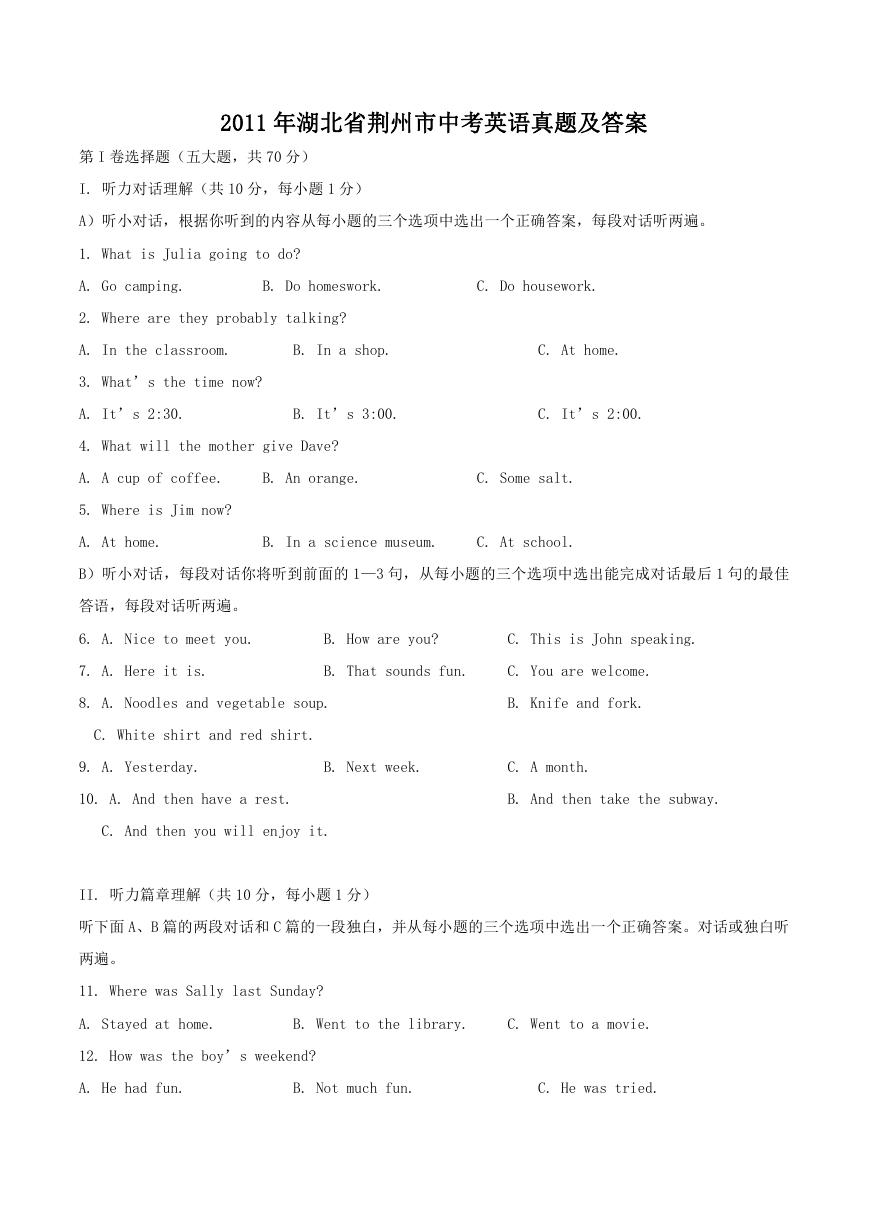
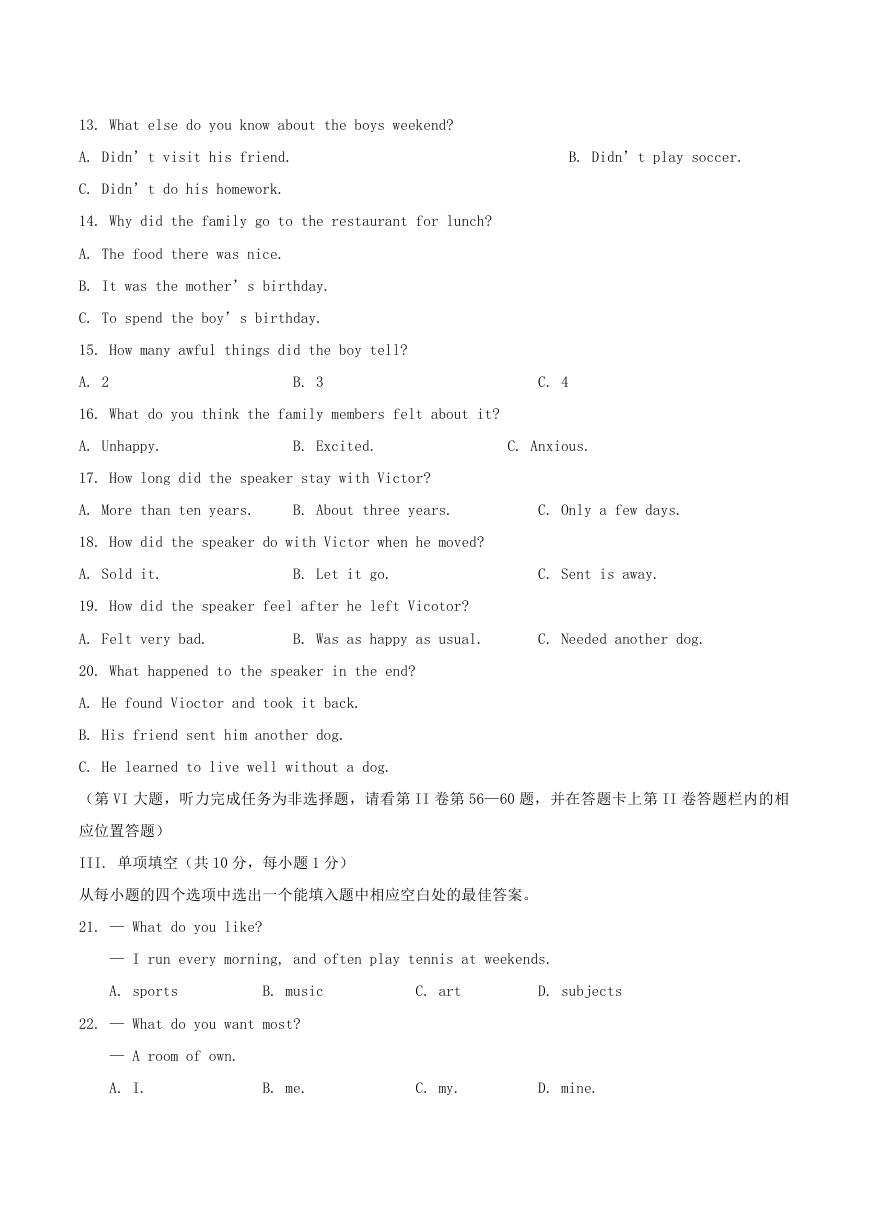
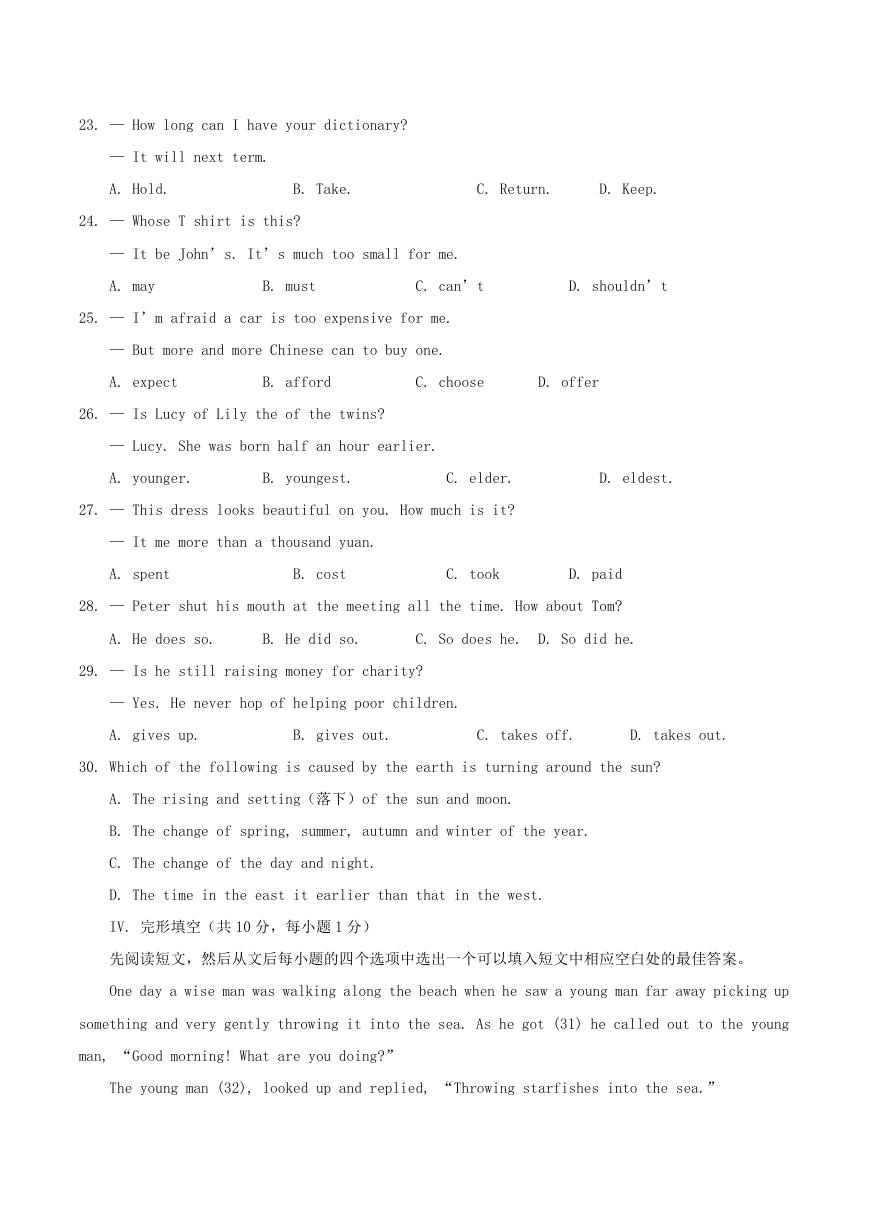
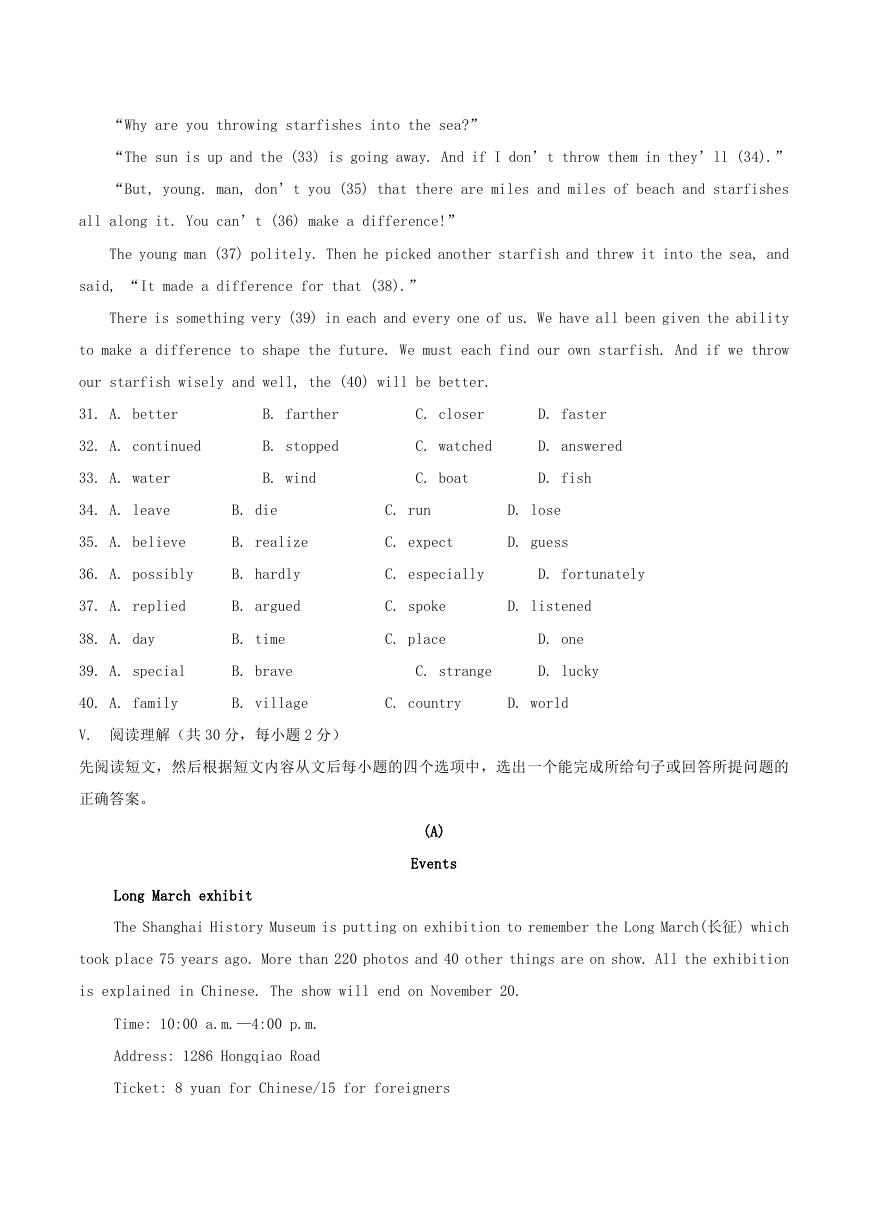
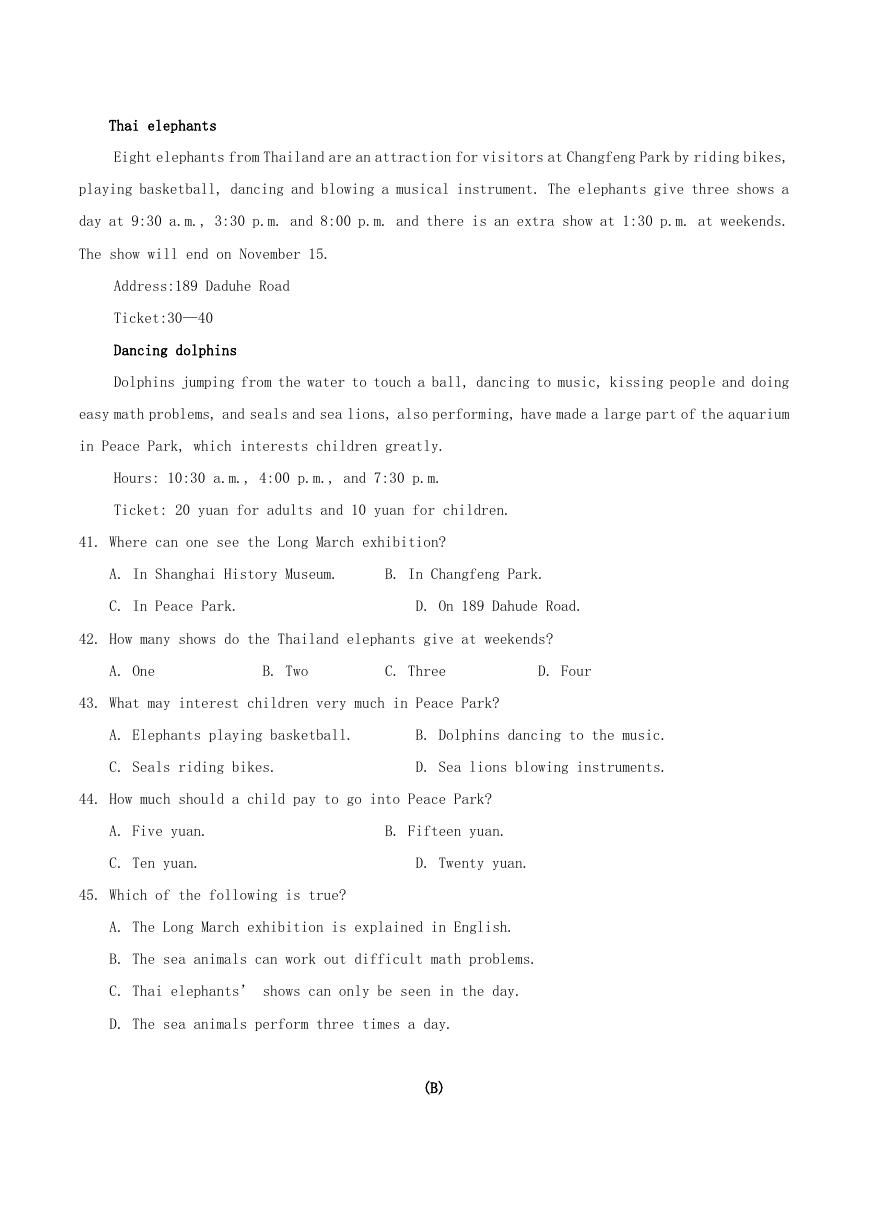
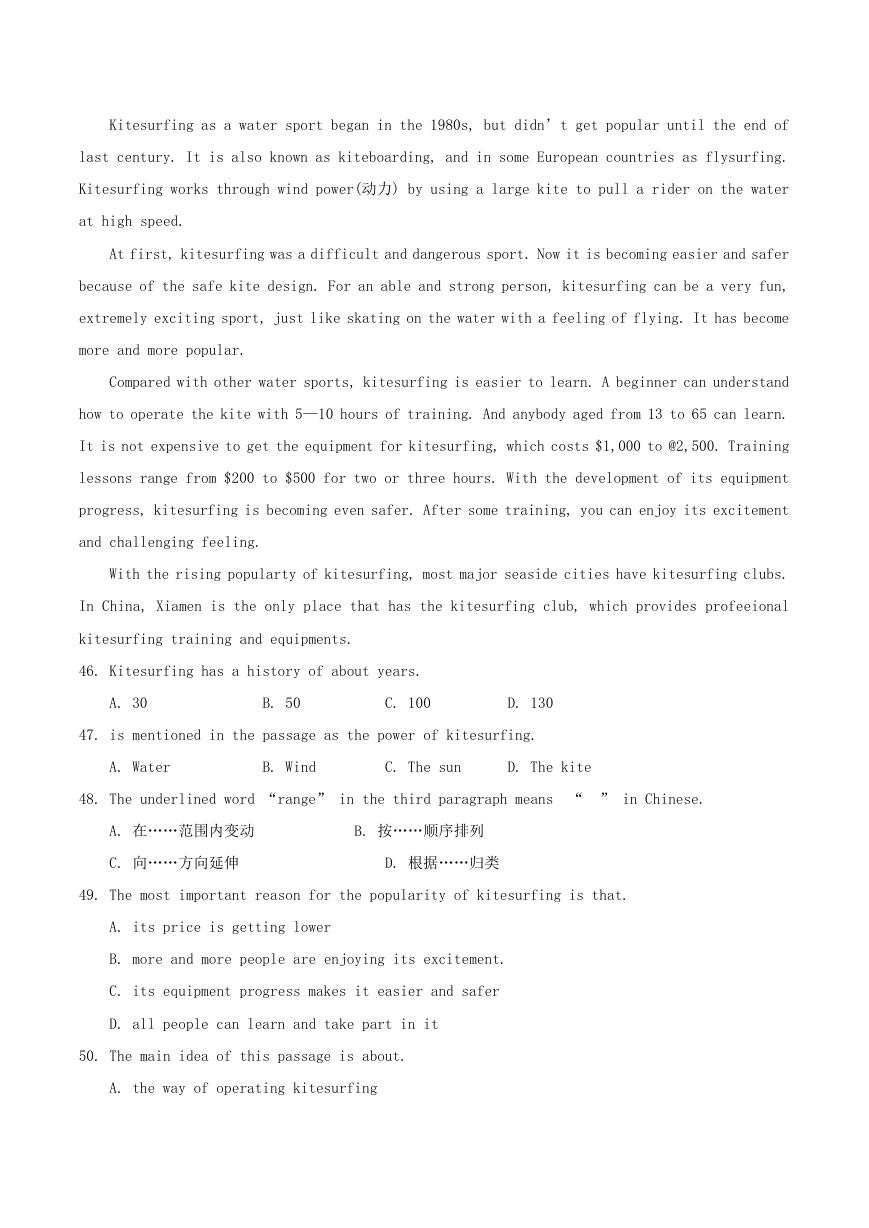
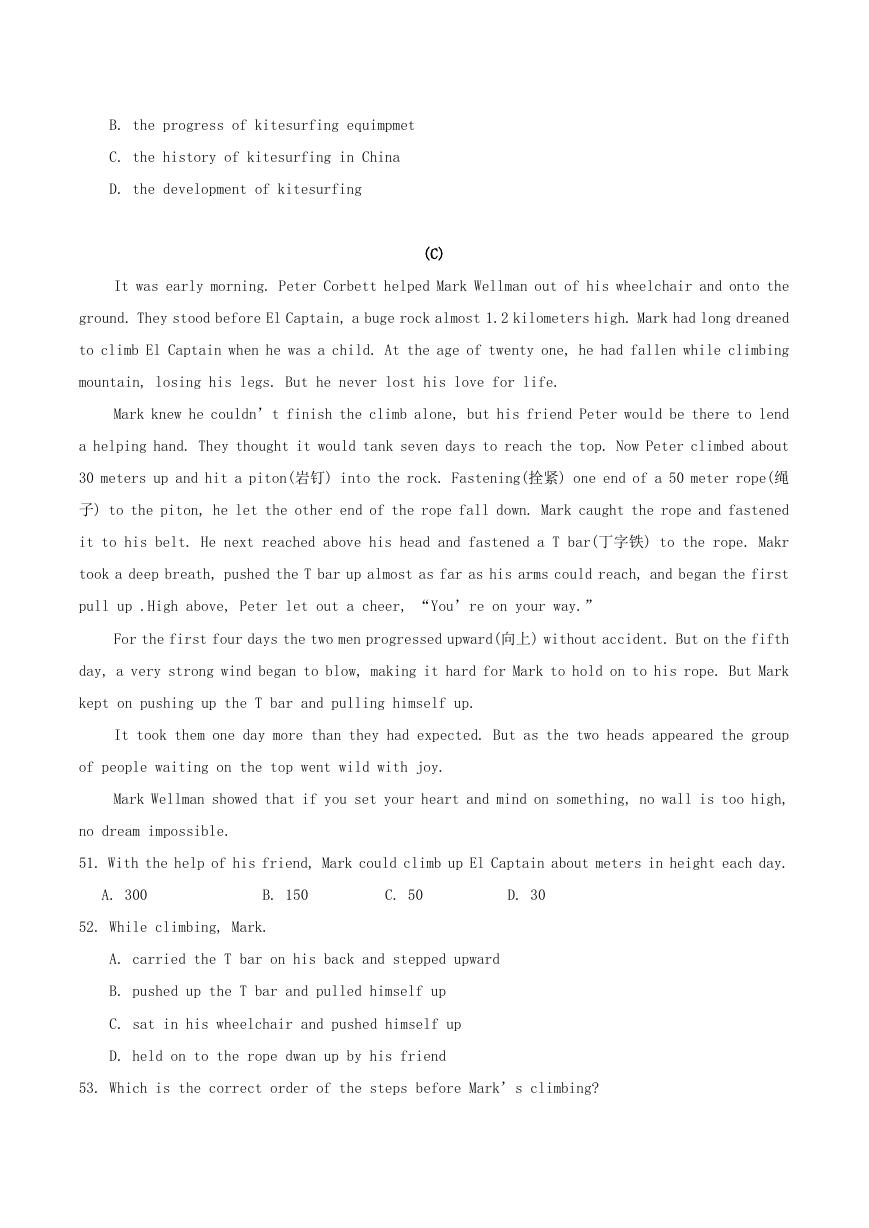
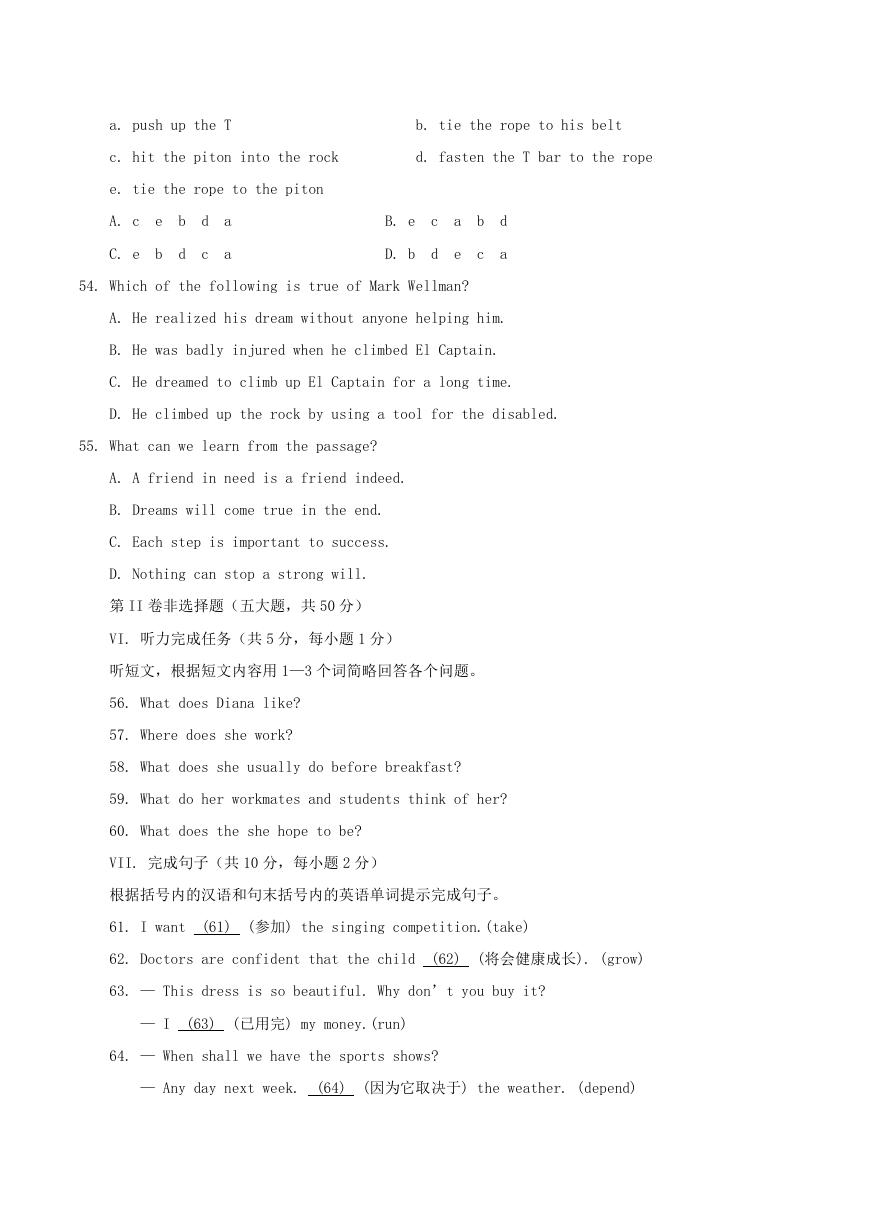








 2023年江西萍乡中考道德与法治真题及答案.doc
2023年江西萍乡中考道德与法治真题及答案.doc 2012年重庆南川中考生物真题及答案.doc
2012年重庆南川中考生物真题及答案.doc 2013年江西师范大学地理学综合及文艺理论基础考研真题.doc
2013年江西师范大学地理学综合及文艺理论基础考研真题.doc 2020年四川甘孜小升初语文真题及答案I卷.doc
2020年四川甘孜小升初语文真题及答案I卷.doc 2020年注册岩土工程师专业基础考试真题及答案.doc
2020年注册岩土工程师专业基础考试真题及答案.doc 2023-2024学年福建省厦门市九年级上学期数学月考试题及答案.doc
2023-2024学年福建省厦门市九年级上学期数学月考试题及答案.doc 2021-2022学年辽宁省沈阳市大东区九年级上学期语文期末试题及答案.doc
2021-2022学年辽宁省沈阳市大东区九年级上学期语文期末试题及答案.doc 2022-2023学年北京东城区初三第一学期物理期末试卷及答案.doc
2022-2023学年北京东城区初三第一学期物理期末试卷及答案.doc 2018上半年江西教师资格初中地理学科知识与教学能力真题及答案.doc
2018上半年江西教师资格初中地理学科知识与教学能力真题及答案.doc 2012年河北国家公务员申论考试真题及答案-省级.doc
2012年河北国家公务员申论考试真题及答案-省级.doc 2020-2021学年江苏省扬州市江都区邵樊片九年级上学期数学第一次质量检测试题及答案.doc
2020-2021学年江苏省扬州市江都区邵樊片九年级上学期数学第一次质量检测试题及答案.doc 2022下半年黑龙江教师资格证中学综合素质真题及答案.doc
2022下半年黑龙江教师资格证中学综合素质真题及答案.doc